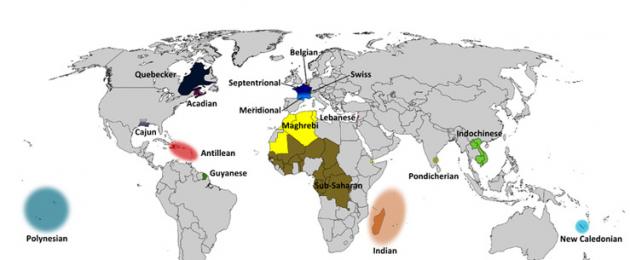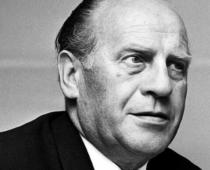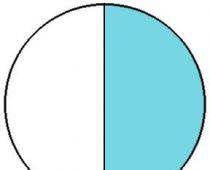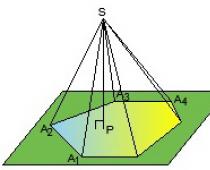Organization history
The term "francophonie" was first used in 1880 by the French geographer Onesime Reclus, who in his scientific classification The inhabitants of the planet decided to proceed from the language they speak. Until the official establishment of the Francophonie as international institute this concept denoted the geographical territories where the French language is spoken, or the totality of people who speak French. In 1968, the word "francophonie" is included in the dictionaries, where it receives two main meanings:
1. speak French, “be a Francophone”;
2. a community consisting of peoples who speak French.
Now the term "La Francophonie" denotes an international intergovernmental organization.
Statistics representing the number of Francophones vary. This is due to the fact that there are several levels of Francophonie: firstly, the inhabitants of countries where French is the only language are taken into account. official language, or coexist with other official languages. Next come the inhabitants of those countries that have chosen French as the language of communication in parallel with the language of their country: this is a variant of many African countries. The third category is represented by people who use French as a tool of culture - in these countries, the language is studied additionally by choice in the system of secondary and higher education as, for example, in the countries of the Maghreb, Egypt, Brazil, Argentina, Poland, Russia, etc.
Areas of cooperation
Francophonie and some problems of world politics
The politicization of the WPF is to a large extent expressed in its active participation (attempts to participate) in the most important matters of world politics. The Summits in Beirut (2002) and Ouagadougou (2004) are especially significant in this regard. The reasons for the political activation of the OIF since the Beirut Summit are both objective and subjective.
Obviously, the terrorist attacks of September 11, 2001 in the USA, the sharp increase in the terrorist threat, and the aggravation of the issue of Iraq belong to the former.
The second can be attributed general course WTF to increase influence in the world, most clearly revealed since the Summit in Hanoi (1997). The Beirut Declaration was adopted in the Lebanese capital, which touched upon the most important issues of world politics. In the declaration, the most important principle of the WIF - the dialogue of cultures - is proclaimed as the main factor in establishing peace and combating terrorism, and thus turns into a real political tool. In particular, the heads of state and government stated: “We are convinced that the dialogue of cultures is necessary condition in the search for peaceful solutions and allows you to fight against ... intolerance and extremism. The same thesis is put forward by Jacques Chirac: "Dialogue of cultures is the best antidote to the risk of a clash of civilizations."
| The country | year of accession |
|---|---|
| Armenia | 2008 |
| Albania | 1999 |
| Andorra | 2004 |
| Belgium | 1970 |
| Benin | 1970 |
| Bulgaria | 1993 |
| Burkina Faso | 1970 |
| Burundi | 1970 |
| Vanuatu | 1979 |
| Vietnam | 1970 |
| Gabon | 1970 |
| Haiti | 1970 |
| Ghana | 2006 |
| Guinea | 1981 |
| Guinea-Bissau | 1979 |
| Greece | 2004 |
| Democratic Republic of the Congo | 1977 |
| Djibouti | 1977 |
| Dominica | 1979 |
| Egypt | 1983 |
| Cape Verde | 1996 |
| Cambodia | 1993 |
| Cameroon | 1991 |
| Canada | 1970 |
| Cyprus | 2006 |
| Comoros | 1977 |
| Ivory Coast | 1970 |
| Laos | 1991 |
| Latvia | 2008 |
| Lebanon | 1973 |
| Luxembourg | 1970 |
| Mauritius | 1970 |
| Mauritania | 1980 |
| Madagascar | 1989 |
| Mali | 1970 |
| Morocco | 1981 |
| Moldova | 1996 |
| Monaco | 1970 |
| Niger | 1970 |
| Republic of the Congo | 1981 |
| Republic of Macedonia | 2001 |
| Rwanda | 1970 |
| Romania | 1993 |
| Sao Tome and Principe | 1999 |
| Seychelles | 1976 |
| Senegal | 1970 |
| Saint Lucia | 1981 |
| Togo | 1970 |
| Tunisia | 1970 |
| Ukraine | 2008 |
| France | 1970 |
| Central African Republic | 1973 |
| Chad | 1970 |
| Switzerland | 1996 |
| Equatorial Guinea | 1989 |
| This section is not completed. |
Organization history
The term "francophonie" was first used in 1880 by the French geographer Onesime Reclus, who, in his scientific classification of the inhabitants of the planet, decided to proceed from the language they speak. Until the official establishment of Francophonie as an international institution, this concept denoted the geographical territories where the French language is spoken, or the totality of people who speak French. In 1968, the word "francophonie" is included in the dictionaries, where it receives two main meanings:
1. speak French, “be a Francophone”;
2. a community of peoples who speak French.
Now the term "La Francophonie" denotes an international intergovernmental organization.
Statistics representing the number of Francophones vary. This is due to the fact that there are several levels of Francophonie: firstly, it takes into account the inhabitants of countries where French is the only official language, or coexists with other official languages. Following are the inhabitants of those countries that have chosen French as the language of communication in parallel with the language of their country: this is a variant of many African countries. The third category is represented by people who use French as a tool of culture - in these countries, the language is additionally studied by choice in the system of secondary and higher education, as, for example, in the countries of the Maghreb, Egypt, Brazil, Argentina, Poland, Russia, etc.
Areas of cooperation
Francophonie and some problems of world politics
The politicization of the WPF is to a large extent expressed in its active participation (attempts to participate) in the most important matters of world politics. The Summits in Beirut (2002) and Ouagadougou (2004) are especially significant in this regard. The reasons for the political activation of the OIF since the Beirut Summit are both objective and subjective.
Obviously, the terrorist attacks of September 11, 2001 in the USA, the sharp increase in the terrorist threat, and the aggravation of the issue of Iraq belong to the former.
The latter include the general course of the WIF to increase its influence in the world, most clearly revealed since the Summit in Hanoi (1997). The Beirut Declaration was adopted in the Lebanese capital, which touched upon the most important issues of world politics. In the declaration, the most important principle of the WIF - the dialogue of cultures - is proclaimed as the main factor in establishing peace and combating terrorism, and thus turns into a real political tool. In particular, the heads of state and government stated: "We are convinced that the dialogue of cultures is a necessary condition in the search for peaceful solutions and makes it possible to fight against ... intolerance and extremism." The same thesis is put forward by Jacques Chirac: "Dialogue of cultures is the best antidote to the risk of a clash of civilizations."
| The country | year of accession |
|---|---|
| Armenia | 2008 |
| Albania | 1999 |
| Andorra | 2004 |
| Belgium | 1970 |
| Benin | 1970 |
| Bulgaria | 1993 |
| Burkina Faso | 1970 |
| Burundi | 1970 |
| Vanuatu | 1979 |
| Vietnam | 1970 |
| Gabon | 1970 |
| Haiti | 1970 |
| Ghana | 2006 |
| Guinea | 1981 |
| Guinea-Bissau | 1979 |
| Greece | 2004 |
| Democratic Republic of the Congo | 1977 |
| Djibouti | 1977 |
| Dominica | 1979 |
| Egypt | 1983 |
| Cape Verde | 1996 |
| Cambodia | 1993 |
| Cameroon | 1991 |
| Canada | 1970 |
| Cyprus | 2006 |
| Comoros | 1977 |
| Ivory Coast | 1970 |
| Laos | 1991 |
| Latvia | 2008 |
| Lebanon | 1973 |
| Luxembourg | 1970 |
| Mauritius | 1970 |
| Mauritania | 1980 |
| Madagascar | 1989 |
| Mali | 1970 |
| Morocco | 1981 |
| Moldova | 1996 |
| Monaco | 1970 |
| Niger | 1970 |
| Republic of the Congo | 1981 |
| Republic of Macedonia | 2001 |
| Rwanda | 1970 |
| Romania | 1993 |
| Sao Tome and Principe | 1999 |
| Seychelles | 1976 |
| Senegal | 1970 |
| Saint Lucia | 1981 |
| Togo | 1970 |
| Tunisia | 1970 |
| Ukraine | 2008 |
| France | 1970 |
| Central African Republic | 1973 |
| Chad | 1970 |
| Switzerland | 1996 |
| Equatorial Guinea | 1989 |
| This section is not completed. |
About statuses
French, along with English, Arabic, Spanish, Chinese and Russian, has the status of an official language of the UN. In addition, French (like English) is considered the working language of the UN Secretariat, and all documents of the Secretariat must be drawn up in French.
The status of the state language among European countries French has, naturally, in France, as well as in Monaco, in Belgium (along with Flemish). In these countries, speaking French gives you a decisive advantage - you will be understood everywhere, and you will be able to read all the menus, signs and understand all the announcements. In Belgium, even Flemish speakers tend to be fluent in French as well.
More difficult with Switzerland. French is one of the four official languages here, but most Swiss speak German. The French-speaking part of the population is about 20% and is concentrated in Romandy, or French Switzerland - an area in the western part of the country, with the administrative center in Geneva. Here, a person who speaks French will also have no language problems.
The status of the state language French, along with English, has in Canada. However, it is only recognized as an official language in the province of Quebec. This part of Canada is considered French-speaking. However, firstly, the French language is not widespread in Quebec, a foreigner will still need an elementary knowledge of English here. And secondly, the language spoken by French-speaking Quebecers is quite different from classical French. The so-called Franco-Quebec dialect contains many borrowings from English and even from some North American Indian languages.
French as a legacy
Benin, Burkina Faso, Gabon, Guinea, Guiana, the Democratic Republic of the Congo, the Republic of the Congo, Madagascar, Mali, Niger, Senegal, Togo - in these countries that were once colonies or "overseas territories" of France in Africa, South and Central America, French has the status of an official or state language. In Lebanon, Burundi, Djibouti, Cameroon, Haiti, Rwanda, Central African Republic, Chad - the status of the second official language. in the Arab countries North Africa, former colonies France, Algeria, Morocco, Tunisia, the French language does not have official status, but is quite widespread.

In itself, the knowledge of the "language of the colonizers" with ignorance of local languages in most of these countries for the traveler may simply be useless. French is most often spoken by a small, most educated part of the population. At best, you can communicate in French with the hotel administrator, as well as with people on public service- border guards, customs officers, less often - police officers. The rest of the citizens of the countries of the "francophone zone" either do not speak French at all, or can communicate in various local dialects of French, usually very vaguely reminiscent of the language in which Moliere wrote his immortal plays.
However, if the ultimate goal of your trip to one of these countries is not tourism, but employment, knowing French will greatly increase your chances of finding a well-paid job. In medicine, education, tourism, as well as in the offices of various international organizations, many Europeans work here, and not only immigrants from France, Belgium, Switzerland, but also citizens of other countries who have studied French.
"La Francophonie"
In a broad sense, the word "francophonie" is used to refer to those countries and territories where people who speak French live. In this sense, it was first used in 1880 by the famous French geographer Onesime Reclus. However, today this term is more often used to refer to the international organization for cooperation of the francophone countries of the world, which has been operating since 1970. 56 states are represented in the "La Francophonie", the motto of the organization is "Equality, Complementarity, Solidarity".
Initially conceived and created as a purely humanitarian organization, the "La Francophonie" over time has become a fairly influential political force. At the same time, the issues of studying and disseminating the French language, as opposed to English, occupy a significant place in the programs of the Francophonie. At the same time, the organization advocates the development of cultural diversity, contributes to the expansion of educational processes, including teaching the French language, in all countries of the world.
(La Journe internationale de la Francophonie). On this day in 1970, in the city of Niamey (Niger), an agreement was signed on the establishment of the Agency for Cultural and Technical Cooperation (ACTC), the first interstate organization of French-speaking countries. Since 2005 - the International Organization of the Francophonie (IOF).
The International Organization of La Francophonie brings together 77 states: 57 members and 20 observers, which is more than 890 million people, a quarter of whom speak French.
The purpose of the organization is to popularize the French language and culture not only of the French people, but also of all other nationalities using this language in everyday life.
In addition to promoting the French language and French-speaking culture, the task of the OIF is to protect democratic principles community development and principles of cultural diversity.
Among the main tasks of the OIF are the prevention, regulation and resolution of conflicts, as well as support for the rule of law; strengthening legal and democratic state, provision and development of human rights in the French-speaking area. In addition, the organization contributes to the expansion educational process, provides active assistance to the development of the economies of French-speaking countries.
"La Francophonie" is a concept that means the very fact of speaking French, a group of people who speak French, for whom it is their native, administrative, teaching or language of choice. "La Francophonie" can mean a society made up of francophone countries, but also a group of countries or regions that are members of an international francophone organization. "La Francophonie" is also the spread of the French language and culture outside of France.
For the first time the concept of "francophony" was used in 1880 by the French geographer Onesime Reclus and began to be used by geographers for descriptions. In the 1960s, the leaders of African states began to use this word to denote a community of states united by one language - French. Today, everyone who speaks French is called Francophone, regardless of whether it is their native language or a foreign one.
The top ten countries where French is widely spoken include, in addition to France, Algeria, Canada, Morocco, Belgium, Côte d'Ivoire, Tunisia, Cameroon, the Democratic Republic of the Congo and Switzerland.
French is one of the most popular foreign languages for studying.
International Francophonie Day is a holiday not only for those who speak French, but for everyone who loves the French language and is interested in French and Francophone culture. The French language is one of the world's cultural values. It was in this language that Voltaire, Denis Diderot, Victor Hugo, Alexandre Dumas, Honore de Balzac, Francois Rabelais spoke and wrote.
March 20 is celebrated differently in each country and, due to its openness, attracts a diverse audience. In Canada, "Meetings with Francophonie" are celebrated, in the Canadian province of Quebec - Francofete ("French holiday"), in Cameroon - Festi "phonie ("Francophonie Festival"). In France, Switzerland, Belgium and other countries, the holiday is represented by the "French Language Week ".
Every year on this day in Paris are held scientific conferences and seminars to which residents of many French-speaking countries are invited. The holiday lasts for several days, accompanied by concerts, various performances and events.
In various cities of Russia in the second half of March, the Days of Francophonie are also traditionally held, organized by the representative offices of the member countries of the OIF, the French Institute in Russia and the Alliance Française network.
The material was prepared on the basis of information from open sources
list of countries where french is spoken
and got the best answer
Answer from Ўliya Vdovichenko[guru]
Countries where French is the national language:
Belgium Belgium
Benin Benin
Burkina Faso Burkina Faso
Burundi Burundi
Cameroon Cameroon
Canada Canada
Central African Republic Central African Republic
Chad Chad
Comoros Comoros
Democratic Republic of the Congo Democratic Republic of the Congo
Djibouti Djibouti
France France
Gabon Gabon
Guinea Guinea
Haiti
Ivory Coast Ivory Coast
Luxembourg Luxembourg
Madagascar Madagascar
Mali Mali
Monaco Monaco
Niger Niger
Republic of the Congo Republic of the Congo
Rwanda Rwanda
Senegal Senegal
Seychelles Seychelles
Switzerland Switzerland
Togo Togo
Vanuatu Vanuatu
Although French is not an official language in Algeria, Morocco, Tunisia, Egypt and Lebanon, it is widely used in literature and cinema.
A source:
French in the world: Dark blue: mother tongue;
Blue: language of administration;
Blue: language of culture;
green: francophone minorities
Francophone refers to the geographical areas where French is spoken, or the totality of people who speak French. Francophonie (fr. La Francophonie) is an international intergovernmental organization of the French-speaking countries of the world. It unites 56 members representing various states or parts of the states of the world, as well as 14 observers. For a list of the countries of the Francophone Community, as well as information about its history and activities, see the page
Answer from 2 answers[guru]
Hey! Here is a selection of topics with answers to your question: a list of countries where French is spoken
Answer from Dasha Volchkova[newbie]
Class!
Answer from Yatiana Kulikova[newbie]
a very beautiful, melodious and romantic language, for centuries aristocrats and nobles spoke it. All the most beautiful things in this world come from France.
- In contact with 0
- Google+ 0
- OK 0
- Facebook 0








